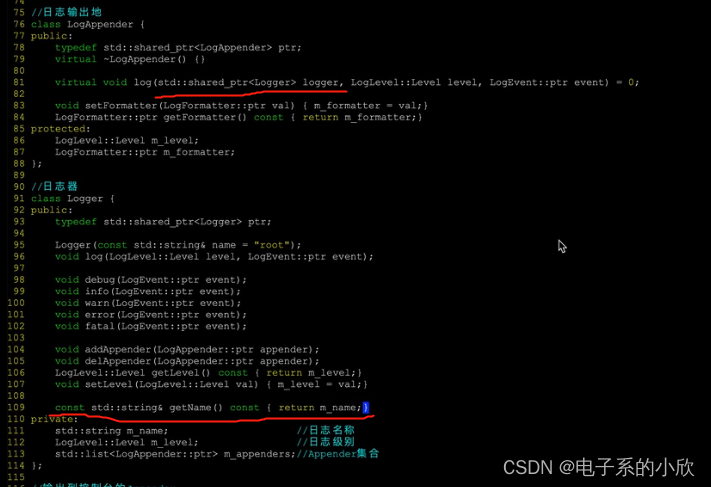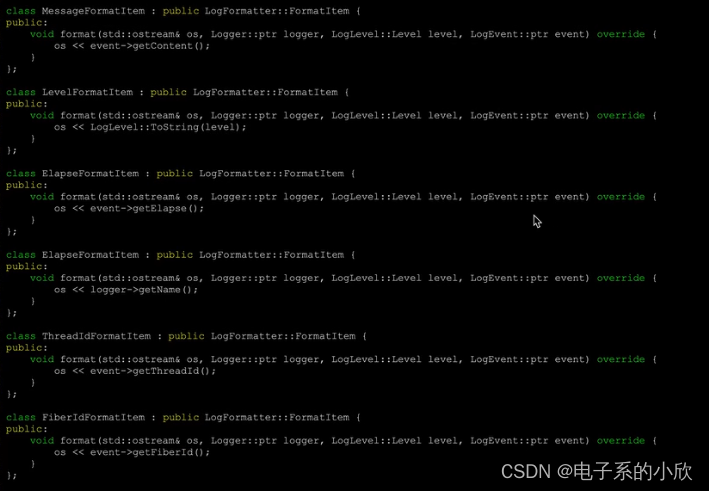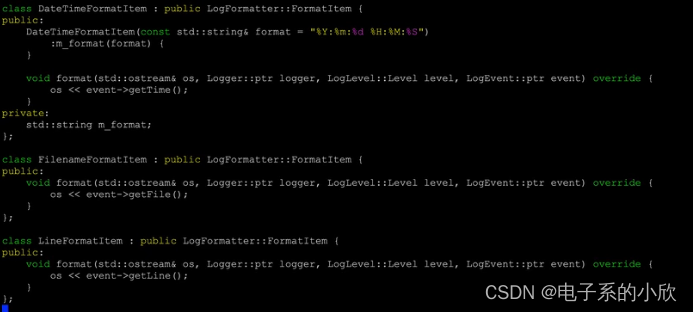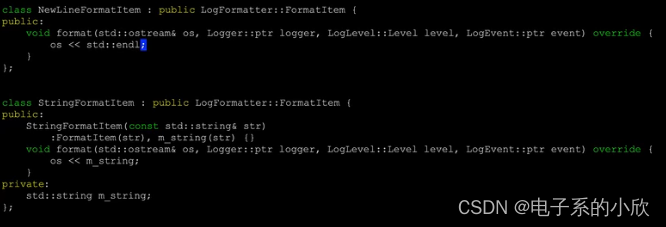您现在的位置是:首页 >其他 >C++服务器框架开发9——日志系统LogFormatter_4/各个类的关系梳理/std::function/std::get网站首页其他
C++服务器框架开发9——日志系统LogFormatter_4/各个类的关系梳理/std::function/std::get
该专栏记录了在学习一个开发项目的过程中遇到的疑惑和问题。
其教学视频见:[C++高级教程]从零开始开发服务器框架(sylar)
上一篇:C++服务器框架开发8——日志系统LogFormatter_3/override/宏定义优化switchcase结构
C++服务器框架开发9——日志系统LogFormatter_4/各个类的关系梳理/std::function/std::get
目前进度
学习完第5个视频。下一节是编译调试,我也会在下篇文章把这1~9的所有代码给出。
要点:
-
log.h中,LogAppender的log函数加了一个指针logger,目的是为了把log的名字传进去,因为在formatter中有输出日志名称的功能;Logger加了一个函数getName(),这个函数就是为了LogAppender加的那个指针logger能够调用这个函数来获取到日志名称。

-
相应的,对LogAppender的子类StdoutLogAppender和FileLogAppender的函数log做修改,对LogFormatter::format也对应做修改,下图是log.cc中的修改。但实际在log.h中也要做给这几个类的函数的形式参数做相应修改(该up可能忘记了)

-
在log.cc中,实现各个FormatItem的子类,并将它们的位置改放到了logger::ToString函数的下方。其中的第2个ElapseFormatItem是写错了,应该是NameFormatItem。



-
在log.h中给FormatItem加了一个带参数的构造函数。

-
在log.cc中的LogFormatter::init后面加上如下的264~293行的内容。之前C++服务器框架开发7中的vec存入了LogFormater::m_pattern中的所有要解析的内容,然后现在要调用各个Item子类对象来格式化,并将内容存入LogMatter::m_items中。

关系梳理
目前在logger中实现的类有logger、LogAppender、LogFormatter,及它们的子类。比较复杂的是各种log和format函数,所以有必要梳理一下它们的关系。
它们各自的成员,大致的调用关系如下图:

std::function学习
要点5中出现了std::function,学习下它。参考字文章1。
std::function是函数包装器,可包装任何类型的可调用实体,包含在头文件<functional>中。
例子:std::function包装lamda表达式
#ifndef __HELLOWORLD__
#define __HELLOWORLD__
#include<iostream>
#include<functional>
#endif
std::function<int(int)> callback;
int main() {
std::cout << "Hello world" << std::endl;
auto fun3 = [](int a) {return a * 2; }; //lamda表达式
callback = fun3; //std::function包装lamda表达式
std::cout << callback(9) << std::endl; //std::function对象实例调用包装的调用实体
return 0;
}

std::get学习
要点5中,用这个读取vec里面的std::tuple。
参考自文章2。
- 在之前的文章C++11 std::tuple 中有使用std::get获取std::tuple元素的例子。
- std::get除了通过索引(C++11)获取std::tuple的元素,还能通过元素类型获取元素。
#ifndef __HELLOWORLD__
#define __HELLOWORLD__
#include<iostream>
#include<tuple>
#include<string>
#endif
int main()
{
std::tuple<int, int> t1{ 1, 1 };
std::cout << "t1 is {" << std::get<0>(t1) << ", " << std::get<1>(t1) << "}" << std::endl;
std::tuple<int, std::string> t2{ 1, "hello world" };
std::cout << "t2 is {" << std::get<int>(t2) << ", " << std::get<std::string>(t2) << "}" << std::endl;
std::tuple<int, int> t3{ 1, 1 };
// error: static_assert failed due to requirement 'value != __ambiguous'
// "type occurs more than once in type list"
// std::cout << "t3 is {" << std::get<int>(t3);
return 0;
}







 U8W/U8W-Mini使用与常见问题解决
U8W/U8W-Mini使用与常见问题解决 QT多线程的5种用法,通过使用线程解决UI主界面的耗时操作代码,防止界面卡死。...
QT多线程的5种用法,通过使用线程解决UI主界面的耗时操作代码,防止界面卡死。... stm32使用HAL库配置串口中断收发数据(保姆级教程)
stm32使用HAL库配置串口中断收发数据(保姆级教程) 分享几个国内免费的ChatGPT镜像网址(亲测有效)
分享几个国内免费的ChatGPT镜像网址(亲测有效) Allegro16.6差分等长设置及走线总结
Allegro16.6差分等长设置及走线总结